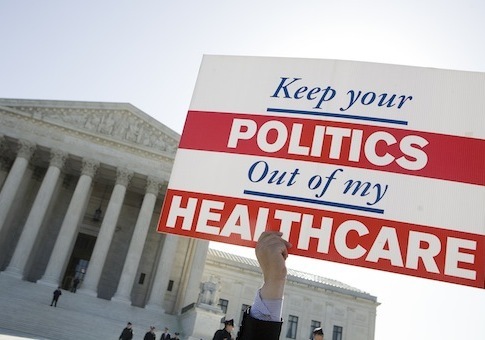This week I’ve been attending and speaking at the Colorado Health Symposium. I am the token happy warrior righty here – I have counted two Republicans out of a crew of more than 500 attendees, and both of them are moderates – but this has made the experience all the more interesting. A few lessons gathered from the first two days of conversation: first, lefty policy wonks are increasingly worried that the health insurance exchanges are going to be problematic, and in some states, non-functional. Colorado is actually much better off in this capacity thanks to a bipartisan exchange bill – they anticipate having as many as 19 insurers in the exchange – but an attendee from Delaware who’s on the board of the exchange there anticipates they will have just two insurers participating (in his words, “some marketplace that is”). A board member for the Colorado exchange shared with me his concerns that the fraud prevention mechanisms they have are simply not ready for prime time, and that they would much rather have another year to get things right… but the politics of it make this impossible.
Second, the concern over rate shock is tangible and real. My presentation focused on this issue, and the attendees responded with an outpouring of personal stories about how skeptical they are that young and healthy people will sign up. Two mothers, both liberal health policy activists, described how hard they had to work to convince their 25 and 26 year old sons to sign up for insurance at all (“but mom, it’s more than $100 a month!”). The audience laughed when I quoted from the recent piece from Timothy Jost suggesting that young and healthy people would sign up out of a sense of social obligation.
Third, there is an abiding sense of frustration that the work of implementing has been difficult and is behind schedule, but the real problem is the public relations side – for which they blame the administration. Descriptions of PR failings and frustration among the law’s supporters are everywhere. John Iglehart, founder of Health Affairs, described last night his frustration that the Obama administration has not approached the promotional efforts for the law with the same degree of investment and verve as the president’s campaign for re-election, and openly questioned whether this could prove to be the law’s undoing.
Fourth, there is a marked preference for talking about the Medicaid expansion issues over the exchanges. Part of this is about concerns over their functionality, but in reality, it’s an opportunity for them to talk about the “right kind” of Republican, one who displays “leadership” and “reasonable qualities” and that sort of thing, as opposed to the intransigent knotheads on Capitol Hill. This leads to the odd circumstance of members of Common Cause talking about how Arizona’s Jan Brewer is, and I quote, a “profile in courage worthy of the Kennedy School” for insisting on expansion, and women’s health advocates talking about how John Kasich represents “just the kind of Republican we need more of.” Bedfellows, etc.
Finally, I think there is now more willingness than ever of the lefty health policy types to admit that Obamacare solves very little in terms of what it is aiming to achieve. Meeting people who have dropped out of the ACO approach over its complexity, who have become frustrated with CMS’s dawdling, who are realizing that this law actually offers them very little in terms of a step toward their longterm goals… it’s an illuminating experience. The conversations go like this: “It was the right thing to do… but it has a ton of problems… and we have to start thinking about what comes next.” This recognition took hold among the smarter liberals in Washington years ago, but it’s now devolved down to the state level. This is an encouraging sign, as it represents recognition on the left’s part that post-2016, this law is going to be reopened, reformed, and significantly altered at a minimum. The only question is whether, based on the outcome of the next two elections, you end up with a next step that has a handful of Democrats or a handful of Republicans. That could lead to significantly different outcomes.
[First Published by Real Clear Politics]




